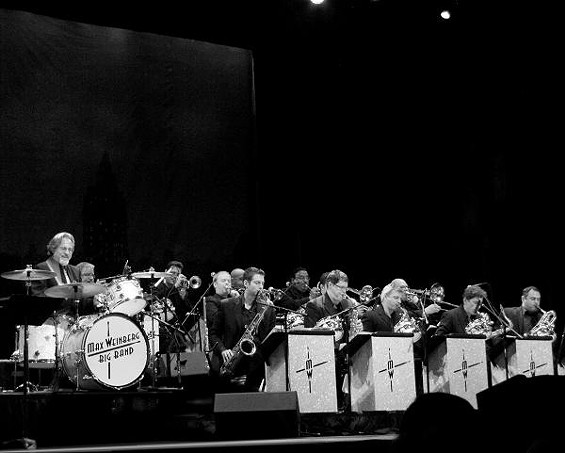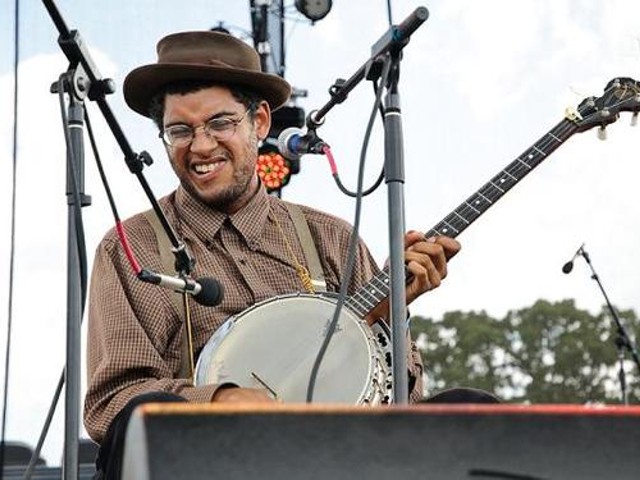The percussive power of legendary E. Street Band drummer Max Weinberg provides the backbone for an endless soundtrack of Bruce Springsteen classics, the results of a creative partnership that's spanned nearly 40 years. In the early '90s, Weinberg was introduced to a whole new generation of fans - many of whom knew him more as a "band leader" instead of a famous rock drummer, thanks to his role as musical director for the fledgling TV show Late Night with Conan O'Brien. Over the past seventeen years, Weinberg has juggled dual identities: He's toured with Springsteen (who has described Weinberg as his "Minister of the Big Beat") and shepherded the Max Weinberg 7 to nightly greatness on Conan's program. For a brief moment, he even stepped into the shoes of one of his influences, Doc Severinsen, during the hot minute that O'Brien and Weinberg were working under the classic banner of The Tonight Show.
And then, Weinberg decided it was time for a break and made the shocking decision to step away from O'Brien's television program. (The new iteration, Conan, is set to return on TBS November 8.) The newly acquired free time gave Weinberg a chance to address his health - he had heart repair surgery earlier this year - and, happily, gave him the opportunity to put together a new project that celebrates his many musical loves and influences, from Frank Sinatra to Buddy Rich and even a few "Boss" tunes tossed into the setlist for good measure. The Max Weinberg Big Band will stop at the Argosy Casino in Alton, Illinois, tomorrow night for a show; tickets are available here. The tour finds Weinberg playing venues that are slightly more intimate than his usual haunts, along with a fifteen-piece band that features a twelve-piece (!!!) horn section. We spoke with Weinberg to get the inside scoop on the current tour. Part two of our chat will appear here tomorrow.
Before we get into things, I should say that it's nice to hear that you're doing well after your heart surgery earlier this year. Yes, this surgery was quite, quite successful and it was something that I knew about for 26 years, and it was really a process of waiting to see if I needed it. What was interesting, to me anyway in the reports that I read, [was that] by the time it got out there, this was life threatening. The word "potential" was left out. [laughs] If I didn't do anything about it, it would have been certainly much, much more serious than it was, although it was serious. But potentially life threatening is actually the case, but I'm 1000 percent and actually I didn't feel bad at all physically before. But it was a genetic condition that had to be repaired and fortunately after doing quite a bit of diligence in finding the right team to correct this, I did. Dr. David Adams in Mt. Sinai Hospital in New York did an absolutely masterful job of fixing the heart valves there, so I'm good to go!
Let's talk about the new project, The Max Weinberg Big Band. This is the first time in nearly twenty years that you've actually had the free time to think about tackling a project like this. Well this project really originated as an outgrowth of the band that I created for the original Late Night program that we did. When I went on TV, I wanted to recall in my musical conception the bands that I watched growing up in the '50s and '60s on television. Of course the prime and best example of what I wanted to do was the Doc Severinsen Big Band. Economics being what they were at the time when we went on in '93, I could only have a seven-piece band. We did the best that we could, but the musical vision that I had was to swing everything rather than just address the music in a modern rock fashion.
After all, at that point, I'd spent fifteen years playing with Bruce and The E. Street Band. I had made my bones in rock and roll, so to speak, and [at least on television] I wanted to move away from a straight rock thing. There were enough rock bands and blues bands so the idea was this kind of jump bluesy swingy musical mix that I came up with, and then at the time, I got the players who could play that stuff convincingly. Through the '90s, I had the pleasure of appearing as a guest artist with lots of jazz ensembles at colleges, actual big bands and it was good, I'd bring my charts and they were students, so I didn't have to pay them [laughs]. We would put on a concert, generally a benefit, so [playing with] the bands began to develop the idea that as an adjunct to the TV show, particularly in Los Angeles, I would follow the Doc Severinsen model and play on weekends with a different big band group, because you can do a lot more with twelve horns, to get that big airy sound. And that's what I'm bringing to Alton, Illinois, is this big, swinging muscular group -- and it's just a delight to play. It's hard work, throwing that much air around for a drummer, you've got to be energetic and fortunately that's always been my approach.
I was definitely impressed by the fact that 12 pieces out of this 15 piece band are horns, because that's just massive. What sort of musician pool were you working with to pull this lineup together? Well these are the best younger -- younger than me -- musicians that New York has to offer. They're the best young jazz artists out there, they're leaders in their own right and they play with some of the biggest names in the business. Several of the guys have played with groups like the Buddy Rich band, Wynton Marsalis's Jazz at Lincoln Center orchestra, so they're absolutely credible jazz musicians. Now myself, I'm a rock era musician and I'm not really a jazz drummer, although I played one on television. I take that approach of my muscularity in rock drumming and basically apply what I saw my favorite drummers outside of the rock world doing on television, and you know, when I'd go see Buddy Rich live.
It's kind of a combination of guys who are amazing soloists, great ensemble players, the best players I've ever played with, just really, really great. Our bass player for example, is a guy named Carlitos del Puerto, who's from Havana and this guy is just on fire, off the charts. Each section of the band are just really great players and I could give you their names and I'm sure jazz fans would remember them, but the chief among them are soloists like Brandon Wright, saxophonist, John Gordon, saxophonist, Michael Boscarino from Pittsburgh on trombone, John Bailey who played with the Buddy Rich band on trumpet, so it's a deep bench that we have.
Weinberg Big Band footage:
I would say that as a student, you've certainly studied your own craft quite a bit, using your book The Big Beat as an example. So I would say that the stuff that you've done with the big band type music, starting with Conan and continuing present day with your current project, could be considered as continuing education. What would you say that playing with these guys has added to your musical palette as a player? Well, my mandate to myself has always remained the same - [primarily] to be the best accompanist that I can be. What's exciting and very direct about this is that this is challenging music to play, so what I'm trying to do as I get older is adhere to Dizzy Gillespie's self-imposed mandate. Play less notes, play less, let the music come through. I'm having a wonderful time really asserting myself as an accompanist to these great soloists, playing very tight charts. There's a lot of improvisation but it's within the context of tightly arranged big band music.
We do a section people might enjoy that we informally call "Big Band Boss," where we take several Bruce Springsteen songs and play them big band style. It's not karaoke like a backing track without a vocal, these are actually dedicated big band arrangements and those go over really, really well. So this is just a further extension, it's all for me, it's a continuum where having left the platform of TV successfully after seventeen years, of course I still play with Bruce and the E. Street Band, which is a great joy of my life. This is a way to take my music that I hear in my head and like to play, out to the people. It's not a question of waiting around for the next big tour, it's just constantly playing as a musician, it's a life led as a musician. And if you can do that and keep yourself playing gigs, that's what it's all about.
I had the opportunity to hear some material from your Connecticut show this past summer and I thought it was interesting on a couple of levels. First of all, you don't really have the opportunity to walk into the average club to hear music like this on stage in the current musical climate. For a setlist standpoint, it was good to hear stuff like "Walk Don't Run" that might be a bit off of the musical path for some people and overall, I thought it was a really interesting presentation of music. Well, thank you! It's basically songs that I culled from the top shelf of my record collection that were fun to me to listen to and would be fun to play. [It's] fun for the audience, because it's heavy on the melodies - it's not just continual improvisation and blowing, so to speak. When we play a Bruce song, and there's a sax solo, you've got an ensemble of five saxophones playing Clarence Clemons' solos. It's an awesome sound and we do some themes from some of my favorite cop TV shows from the late '50s and '60s which are fun. You don't get to hear great themes on TV anymore, generally because there's not enough time, given the landscape of TV, to devote to music. You won't see a big band playing this kind of music with this kind of energy in your town in a small club. And it's my pleasure to be able to travel around and do what we do with Bruce and the E. Street Band - we get off the bus, we roll into your city and try to knock everybody's socks off, get back on the bus and go to the next city.
Are there any plans to knock down a studio album with this band? Well, I've made a lot records in my time [laughs]. I enjoy the process, but right now I'm really concentrating on the live presentation, but I do have an idea for a CD. I refer to them as a record, because after all, what it is is a "record" of what you're doing. Certainly, I have fulfilled all of my recording dreams already but I think it would be a nice souvenir for people who come to see us play to have something to take home.






